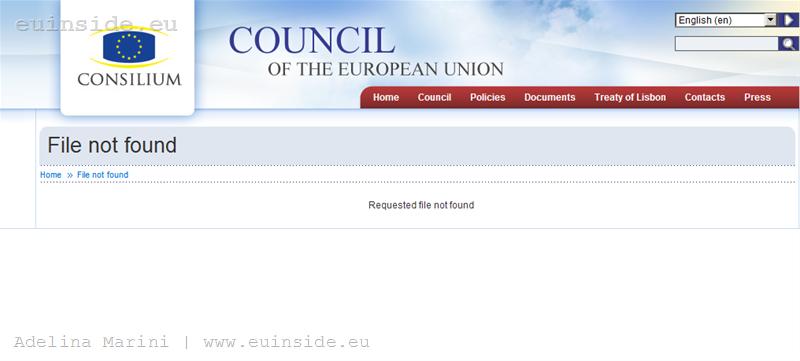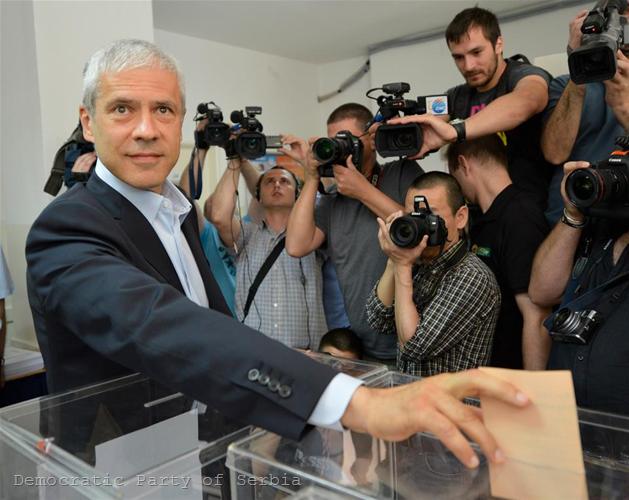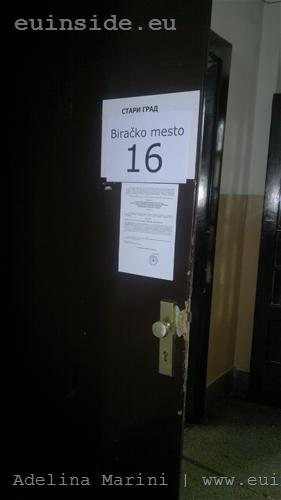Serbia's Big Challenge
Adelina Marini, May 6, 2012
 If one watches the Serbian national TV for a long time he or she might feel a real Serb in a while. So strong is the feeling of a nation and its capabilities, future and most of all past. And not only the TV - all over Belgrade you can hear mainly Serbian songs. Against this background, not less impressive are the advertisements on TV of discounts in the supermarkets - cheap lamb meat for St George Day, pork at a good price, salami, cheese, which inclines to other thoughts - patriotism is OK but one needs to eat as well, if possible at a good price because otherwise it would be difficult. The atmosphere in some parts of Belgrade makes one think as well - people think more about their survival rather than how good and clean their environment is. And the number of casinos is a certain indicator of poverty. In the same time, unlike Bulgaria for instance, in the Serb capital city intensive infrastructure construction is taking place.
If one watches the Serbian national TV for a long time he or she might feel a real Serb in a while. So strong is the feeling of a nation and its capabilities, future and most of all past. And not only the TV - all over Belgrade you can hear mainly Serbian songs. Against this background, not less impressive are the advertisements on TV of discounts in the supermarkets - cheap lamb meat for St George Day, pork at a good price, salami, cheese, which inclines to other thoughts - patriotism is OK but one needs to eat as well, if possible at a good price because otherwise it would be difficult. The atmosphere in some parts of Belgrade makes one think as well - people think more about their survival rather than how good and clean their environment is. And the number of casinos is a certain indicator of poverty. In the same time, unlike Bulgaria for instance, in the Serb capital city intensive infrastructure construction is taking place.
What is the economic situation in Serbia?
In September 2011 the International Monetary Fund (IMF) has approved an 8-month stand-by arrangement with Serbia, worth 1.1 bn euros. But for now the Serbian government is refusing to use this money and is keeping it for just in case. And a case might arise soon, not because the government might take a wrong turn (which is not excluded) but more or less because of the economic decline in the EU. In 2008 Serbia enjoyed relatively healthy growth of 5.5% of GDP. But the global economic crisis did not miss this country too, which lived through a bitter war only 10 years earlier and in 2009 the country already had negative growth of -3%. Last year, in the first half, according to IMF data, Serbia was at a plus again with 2.75%. The main motors of growth are investments and exports.
Alas, because of the crisis in Europe, the gross domestic product of the country is expected to grow by half a percentage this year. Again according to the IMF analysis, Serbia is still only partly integrated with the regional supply chain of the EU. Nonetheless, the existing links lead to a decline of trade, which hits hard the exports of the country. For now Serbia has buffers - good level of foreign exchange reserves, flexible and competitive exchange rate, relatively assuring indicators of bank funding  risks. Nevertheless, contagion risk from vulnerable regional economies is high. This is why the Fund recommends Serbia to enhance its financial buffers.
risks. Nevertheless, contagion risk from vulnerable regional economies is high. This is why the Fund recommends Serbia to enhance its financial buffers.
So far the authorities respond well to the declining growth and slowing inflation. The big challenge, however, is unemployment. Last year the number of unemployed in Serbia was 22.2% and the 2012 projections are for an increase - to 22.4%. This is one of the highest levels of unemployment in Europe, only Spain has a higher share. IMF's assessment, though, is that employment in private sector continues to decline, while the public sector has maintained its high employment level. The private sector has shed about 20 percent of its jobs since 2008. It is important to note that a large part of them are in companies that rely on state subsidies. The Fund points out that the official statistics is not capable of capturing the overall condition of the labour market in Serbia.
The country's debt is also high, although it still is within the framework of decency - 45%. The forecast, however, is for increase in 2012. Last year the public debt was 44.1% of GDP but it is expected to reach 44.5% this year.
What solution do the main opponents in the elections offer?
 Boris Tadic's Democratic Party bets in its programme on getting closer to the European Union. According to the "Programme for a Better Life" of the democrats, the gaining of a candidate country status is a huge step forward for the achieving of the main goal - a modern Serbia in Europe. "For us Europe is not just a concept but real, specific things - functioning institutions, improved infrastructure, better macro-economic, political and legal stability", the programme reads. More specifically, however, this important step forward to European membership, opens broadly the European treasury for funding of the Serbian economy.
Boris Tadic's Democratic Party bets in its programme on getting closer to the European Union. According to the "Programme for a Better Life" of the democrats, the gaining of a candidate country status is a huge step forward for the achieving of the main goal - a modern Serbia in Europe. "For us Europe is not just a concept but real, specific things - functioning institutions, improved infrastructure, better macro-economic, political and legal stability", the programme reads. More specifically, however, this important step forward to European membership, opens broadly the European treasury for funding of the Serbian economy.
The expectations of the democrats are the EU funds to help finance investment  projects, which would create conditions for new jobs, it would also increase the volume of trade, an influx of new capital and a more effective industry because of the new technologies. On the website of the party there is also a comparison, showing what amounts of pre-accession funds has Serbia absorbed so far and what are the expectations for the future. Before getting the status Serbia had received 800 mn euros under the pre-accession instrument IPA, with which 129 projects were funded in the period 2007-2011. After the candidate status 1.4 bn euros are expected, estimated to be around 4% of GDP.
projects, which would create conditions for new jobs, it would also increase the volume of trade, an influx of new capital and a more effective industry because of the new technologies. On the website of the party there is also a comparison, showing what amounts of pre-accession funds has Serbia absorbed so far and what are the expectations for the future. Before getting the status Serbia had received 800 mn euros under the pre-accession instrument IPA, with which 129 projects were funded in the period 2007-2011. After the candidate status 1.4 bn euros are expected, estimated to be around 4% of GDP.
How does the Democratic Party intend to improve the Serbs' life? The programme is divided into 10 chapters, listed in the following order: building infrastructure and protection of the environment; strengthening exports, the industry and agriculture; boosting birth rates and reducing poverty [the population of the country is 7,310,555  people but the demographic trend is negative, although far from the EU average, which can be seen in the streets - still many young people]; improving the conditions of life through reforming the systems of education, health care, culture and sports; investment in knowledge economy [a purely European priority]; enhancing democratic institutions and decentralisation; efficient judiciary and fight against corruption and organised crime; protection of the territorial integrity and balanced foreign policy.
people but the demographic trend is negative, although far from the EU average, which can be seen in the streets - still many young people]; improving the conditions of life through reforming the systems of education, health care, culture and sports; investment in knowledge economy [a purely European priority]; enhancing democratic institutions and decentralisation; efficient judiciary and fight against corruption and organised crime; protection of the territorial integrity and balanced foreign policy.
 The programme of the new Serbian Progressive Party (SPP) of the former (really?) radical Tomislav Nikolic contains 20 points, presented more like slogans than real programme intentions, due probably to the lack of managerial experience: strong economy - conditions for a modern and strong Serbia; attracting investments - a condition for growth; Kosovo and Metohija - part of Serbia [the third priority]; Serbia in Europe and in cooperation with the world [the EU is after Kosovo as a priority]; political principles for protection of the rights of national minorities; a comprehensive and decentralised Serbia; agriculture as a chance for Serbia; development of energy and mining is a perspective for Serbia; transport, infrastructure and tourism - a condition for development of the other commercial and industrial
The programme of the new Serbian Progressive Party (SPP) of the former (really?) radical Tomislav Nikolic contains 20 points, presented more like slogans than real programme intentions, due probably to the lack of managerial experience: strong economy - conditions for a modern and strong Serbia; attracting investments - a condition for growth; Kosovo and Metohija - part of Serbia [the third priority]; Serbia in Europe and in cooperation with the world [the EU is after Kosovo as a priority]; political principles for protection of the rights of national minorities; a comprehensive and decentralised Serbia; agriculture as a chance for Serbia; development of energy and mining is a perspective for Serbia; transport, infrastructure and tourism - a condition for development of the other commercial and industrial  sectors; fight against corruption and crime; health care; social policy and social justice; restitution; strategy for the young - the strength of the future; strategy for the pensioners - a care for our present; culture, science and education - a bet for the future; protection of the environment and of the natural resources and riches - a path toward sustainable development; homeland and diaspora - an unbreakable whole; development of sports.
sectors; fight against corruption and crime; health care; social policy and social justice; restitution; strategy for the young - the strength of the future; strategy for the pensioners - a care for our present; culture, science and education - a bet for the future; protection of the environment and of the natural resources and riches - a path toward sustainable development; homeland and diaspora - an unbreakable whole; development of sports.
Decentralisation and rationalisation
 You have hardly paid attention but in the programme of the two parties the word decentralisation is mentioned, which is an important process of regional development and for Serbia this process has a very special significance and often is a subject of disputes in the public domain. As the analytical centre Osservatorio Balcani e Caucaso writes, discussing rationalisation and regional policy to a large extent has turned into a strongly politicised topic, which shifts the focus from regional development and cohesion. As Kosovo is a special case, it does not participate in the context of decentralisation and regionalisation. By the way, Serbia, as well as many countries in Southeast Europe, suffers from energy drain of the smaller and poorer regions, dooming them to even bigger poverty and in the end of the day - of death.
You have hardly paid attention but in the programme of the two parties the word decentralisation is mentioned, which is an important process of regional development and for Serbia this process has a very special significance and often is a subject of disputes in the public domain. As the analytical centre Osservatorio Balcani e Caucaso writes, discussing rationalisation and regional policy to a large extent has turned into a strongly politicised topic, which shifts the focus from regional development and cohesion. As Kosovo is a special case, it does not participate in the context of decentralisation and regionalisation. By the way, Serbia, as well as many countries in Southeast Europe, suffers from energy drain of the smaller and poorer regions, dooming them to even bigger poverty and in the end of the day - of death.
The situation, however, is still reversible, according to Osservatorio Balcani i Caucaso. The reasons for this phenomenon are fast expansion of the non-tradable sector (in which two thirds of investments are directed to services) and the  significant and constant process of de-industrialisation, which had led to a decline of the standard of living in the rural areas. Rural poverty was 13.6% in 2010, which is much higher than the urban areas, where it was only 5.7%. Even more striking are the data of the GDP - in Belgrade the gross domestic product per capita was 80 percentage points higher than the average for Serbia. As a result, the process of migration from the rural to the urban areas, especially Belgrade, is growing.
significant and constant process of de-industrialisation, which had led to a decline of the standard of living in the rural areas. Rural poverty was 13.6% in 2010, which is much higher than the urban areas, where it was only 5.7%. Even more striking are the data of the GDP - in Belgrade the gross domestic product per capita was 80 percentage points higher than the average for Serbia. As a result, the process of migration from the rural to the urban areas, especially Belgrade, is growing.
Therefore, regionalisation of the country is not simply a political and economic challenge, but also a psychological one because Serbia has to tackle a double heritage - the former socialist republic of Yugoslavia and the regime of Milosevic, the analytical centre notes. It is because of Kosovo and the autonomy of Vojvodina that has turned regionalisation into a thorny question, which in times raises the issue of political stability and national unity, as well as territorial integrity.
 All these are gigantic challenges for Serbia, which today has to make a not very bright choice - between the old, well known face of Boris Tadic, who practically is standing for a third term and quite justified are the questions - why nothing of what you promise has not been done - and the new, controversial face of Tomislav Nikolic, who has no governing experience but instead he is well known in the country and Europe with his radical, chauvinistic and nationalist statements. Many in Europe realise that the elections in Serbia are not less important than those in France and Greece (also today) but they will remain in the rear because on France the future of Europe depends and on Greece - the future of the euro area. May be from this perspective, somewhat symbolic is that this important choice will be made on St George Day - the day of the brave and courageous. Serbia definitely needs a brave choice and a courageous leader.
All these are gigantic challenges for Serbia, which today has to make a not very bright choice - between the old, well known face of Boris Tadic, who practically is standing for a third term and quite justified are the questions - why nothing of what you promise has not been done - and the new, controversial face of Tomislav Nikolic, who has no governing experience but instead he is well known in the country and Europe with his radical, chauvinistic and nationalist statements. Many in Europe realise that the elections in Serbia are not less important than those in France and Greece (also today) but they will remain in the rear because on France the future of Europe depends and on Greece - the future of the euro area. May be from this perspective, somewhat symbolic is that this important choice will be made on St George Day - the day of the brave and courageous. Serbia definitely needs a brave choice and a courageous leader.
 Bakir Izetbegovic, Andrej Plenkovic | © Council of the EU
Bakir Izetbegovic, Andrej Plenkovic | © Council of the EU Aleksandar Vucic, Recep Tayyip Erdogan | © Serbian Presidency
Aleksandar Vucic, Recep Tayyip Erdogan | © Serbian Presidency Jean-Claude Juncker, Zoran Zaev | © European Commission
Jean-Claude Juncker, Zoran Zaev | © European Commission | © euinside
| © euinside | © Democratic Party of Serbia
| © Democratic Party of Serbia | © euinside
| © euinside